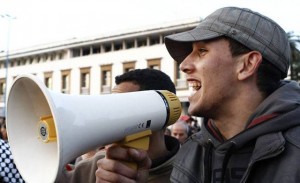 While fans and critics of American rap music have long bemoaned the lack of political change that rap was “supposed” to bring about in the U.S., the same criticisms can’t be made about rap in the Middle East–at least not right now. Rap has played a central role in some of the so-called Arab Spring uprisings, particularly in places like Tunisia and Libya, and now it appears that authorities in Morocco are trying their best to ensure that rap doesn’t sow the seeds of resistance in their country as well. Al Arabiya reports that Moroccan rapper Mouad Belghouat, aka al-Haqed (“The Vengeful One” in Arabic), was arrested today in Casablanca for a song denouncing the police. Apparently, this is not the first time he has been put in jail for criticizing the state.
While fans and critics of American rap music have long bemoaned the lack of political change that rap was “supposed” to bring about in the U.S., the same criticisms can’t be made about rap in the Middle East–at least not right now. Rap has played a central role in some of the so-called Arab Spring uprisings, particularly in places like Tunisia and Libya, and now it appears that authorities in Morocco are trying their best to ensure that rap doesn’t sow the seeds of resistance in their country as well. Al Arabiya reports that Moroccan rapper Mouad Belghouat, aka al-Haqed (“The Vengeful One” in Arabic), was arrested today in Casablanca for a song denouncing the police. Apparently, this is not the first time he has been put in jail for criticizing the state.
What’s important to remember is that rappers in the U.S. have long faced a similar threat from authorities. In its earliest days, hip hop drew the wary gaze of law enforcement–there are countless examples of police surveillance, harassment, and containment of hip hop artists throughout the movement’s history, up to and including the present. The FBI’s response to NWA’s 1988 song “Fuck tha Police” is a notable example, but it’s hardly an isolated one. (See my piece in PopMatters for more on this topic.) Indeed, hip hop has always had to contend with the oppressive state apparatus that tries to undermine or contain rebellion, especially among black Americans.
When trying to explain why rap has had a less-than-desired impact on American politics, scholars often point to the recording industry as the main culprit. This is a legitimate but overplayed argument. I think we also need to look more at the mechanisms of repression that have made planting the seeds of resistance extremely difficult for black artists in the U.S. Only time will tell if rappers in the Arab world have better, more enduring results.
